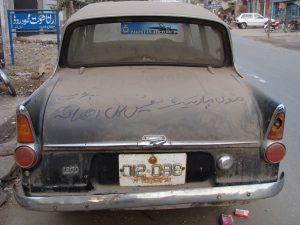I had never even heard of Moon Market. Iqbal Town is several kilometres away from Gulberg, where I live and work, and is a kind of mini-city on its own. I visited there once, to drop a student home, and got lost on the way back. I’m not a native Lahori and it’s a strange, agglutinative city, so I think I can be forgiven.
On December 7, 2009, there were two explosions in Moon Market in Iqbal Town that killed 48 people and destroyed dozens of businesses. According to the BBC report, the first explosion was set off at the back of building causing people to run towards the front, where the second went off, trapping them in.
The market was ablaze for a long time. A lot of the market was cloth, which takes fire well. The charred ruins standing there now are just as horrific. A friend had written on Facebook that his mother and sister had just left the market twenty minutes earlier, and all the shopkeepers that they’ve been trading with for 20 years are dead.
On my way to work yesterday, I spotted a car parked on the side of the road, in front a mechanics shop. It looks like an 80s model car, dilapidated, covered in the dust of ages. On the boot, freshly scored, were the words in Urdu, “There was a blast in Moon Market yesterday.” After I took this photograph, I asked the men who are perennially standing around in such places, smoking and shooting the breeze, how long the car had been there. “One year,” said a man. I asked if they knew who had written this on the car. The man said, “Written what?” I pointed to the lettering. “I don’t know, someone around here must have,” indicating the mechanics shop across the narrow street, “or some kid.”

It’s strange that the city bears testament to these events in these small and transient ways, and yet the city also fails to notice. Someone in Gulberg writes in dust on a car that he would like you to know there was an explosion yesterday. Someone else who sits right near that place everyday fails to notice the event even occurred. And someone else still drives by and is moved to take a photograph. But Moon Market is so far away.
Benedict Anderson wrote a book about nations in the 80s, calling them imagined communities, imagined because people who don’t know and will never know each other imagine that together they are a single political entity. Perhaps the imagined community here is Lahore, perhaps something even more specific than that, but the graffitist found strangers and shared something with them.
Contrast that to the professionally printed banner up on Canal Road at the junction of Mall: “In solidarity with the traders of Moon Market, there will be a shutter-down strike on 9/12/09 – Muslim League (Nawaz), Traders’ Wing.” A political party, the party of the opposition, is taking action. But to what end, it is unclear.
The city was shaken. But there was a blast in Peshawar the same day and in Multan the next so, to some extent, the city has also moved on. There are Facebook groups calling for more police to be deployed in the city and less detailed to VIPs, but I don’t think most VIPs are on Facebook. That the government is not protecting us is clear and if a strike is going to put pressure, more power to them.
All I know is when a bomb goes off in Lahore, Lahoris react viscerally, but when one goes off in Multan or Peshawar, we care less here. I don’t know if that’s an overkill of bombings, or the apathy of a city privileged over others. Or maybe we’re not really a nation anymore, but an agglutination of communities imagining they are more together than they actually are.
On December 8, as the city rang with talk of the rising death toll, the possible attackers (this wasn’t a suicide attack, you see), SMSed Arabic prayers to fortify the nation’s spiritual strength and laments at the state of Pakistan, nobody noticed, really, that on December 8, there had also been a blast in Multan, a large city south of Lahore…
